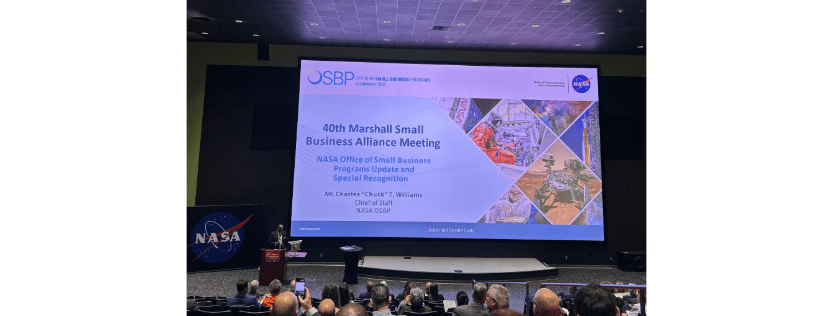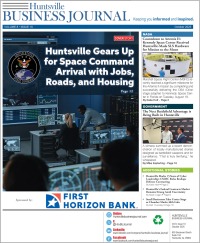From the Moon to Mars: NASA Marshall Space Flight Center Seeks Small Business Partners for Future Missions
NASA’s Marshall Space Flight Center (MSFC) held its 40th Small Business Alliance Meeting last week on September 25 at the U.S. Space and Rocket Center.
This half-day event, which typically occurs twice a year, gave small businesses access to NASA leaders, as well as industry contacts from various companies and partners that interface with the space organization. Representatives from Team Redstone and other government agencies were also on hand to meet with attendees.
These organizations also exhibited at the event, providing small business representatives with an opportunity to meet with them and ask questions.
Presentations from NASA leaders took place from 8:00 to 11:30 a.m. in the theater at the Davidson Center.
Currently, NASA’s primary focus is on its Artemis II mission, which is scheduled to launch to the moon with a crew in February 2026.
During his presentation, Davey Jones, NASA MSFC Center Strategy Lead, stated that the center is actively seeking small businesses to partner with for future Artemis missions, as well as the agency’s mission to Mars.
“We are actively seeking partnerships that leverage our unique strengths in propulsion systems integration and advanced manufacturing,” Jones said.
Jones noted MSFC’s successes this year in collaborating with businesses and organizations outside of NASA.
“Marshall has experienced record numbers of partnerships this year. We have well over 400 active partnerships this year alone from every facet of the community, both industry, academia, and other government agencies, and we’re very proud of that,” Jones said.
Jones continued, “These partnerships extend our impact, bring in new perspectives, and help us remain agile in a rapidly evolving space economy. Collaboration is essential to staying at the forefront of innovation.”
NASA Office of Small Business Programs Chief of Staff Chuck Williams provided an update on the current changes within his department, resulting from layoffs and the federal government’s retirement package offered this year.
According to Williams, his office shrank from 20 to 14 employees. Although the Small Business Programs Office at NASA is smaller now, Williams wanted to let attendees know that his department is still working diligently.
“Rest assured, every day these folks are really working and fighting for small business opportunities, whether subcontract or prime contracting,” Williams said.
Williams acknowledged the strain on his office but stressed their commitment to keeping NASA’s small business programs active.
“If you’ve noticed across the federal government, there’ve been a lot of agencies that have lost their entire small business office. And for us, that’s our fight. We’re not going away,” he said.
Nick Case, Manager of the Marshall Partnership and Opportunities office, emphasized the importance of NASA’s collaboration with small businesses, citing their ability to work quickly and creatively.
“Small businesses are essential to our success. You have the agility to move fast. You can specialize in technical capabilities that are world-class. Often, the innovative edge that we need to solve our problems comes from small businesses,” Case said.
Case also pointed out the budget challenges NASA is facing, spotlighting the need to lower costs by streamlining efforts on current and future projects within the agency.
“Secretary Duffy put it plainly, we need to bring costs down on Artemis, and we need to do more missions with the same amount of money. That means we need to rethink our approach. We need to partner more deeply with industry, and we need to share investment and reduce duplication,” Case said.
According to Case and other speakers, small businesses are crucial to the agency’s ability to lessen expenses. Case, in particular, highlighted how these organizations can work with MSFC specifically to do this.
“Small businesses, you play a critical role in being able to prototype quickly to get hardware into the test, into the field, so that we can demonstrate capabilities as soon as possible. You can work lean small teams at many hours and deliver novel solutions that are going to be needed to reduce risk and costs,” Case said.
During the meeting, David Brock, MSFC’s Small Business Specialist (Office of Procurement), was honored for his upcoming retirement this December. Brock faithfully worked at MSFC for 41 years. Several NASA leaders spoke highly of Brock and the positive influence he had on both the organization and on them personally and professionally.
The next MSFC Small Business Alliance meeting is scheduled for March 2026. Small businesses interested in working with MSFC can contact one of the center’s many representatives or visit the organization’s website.















